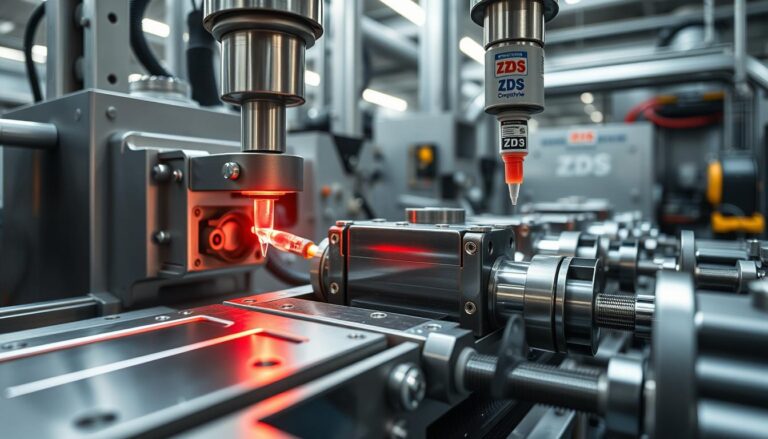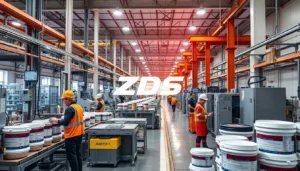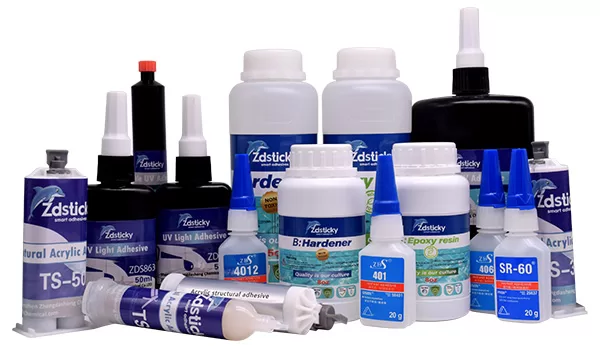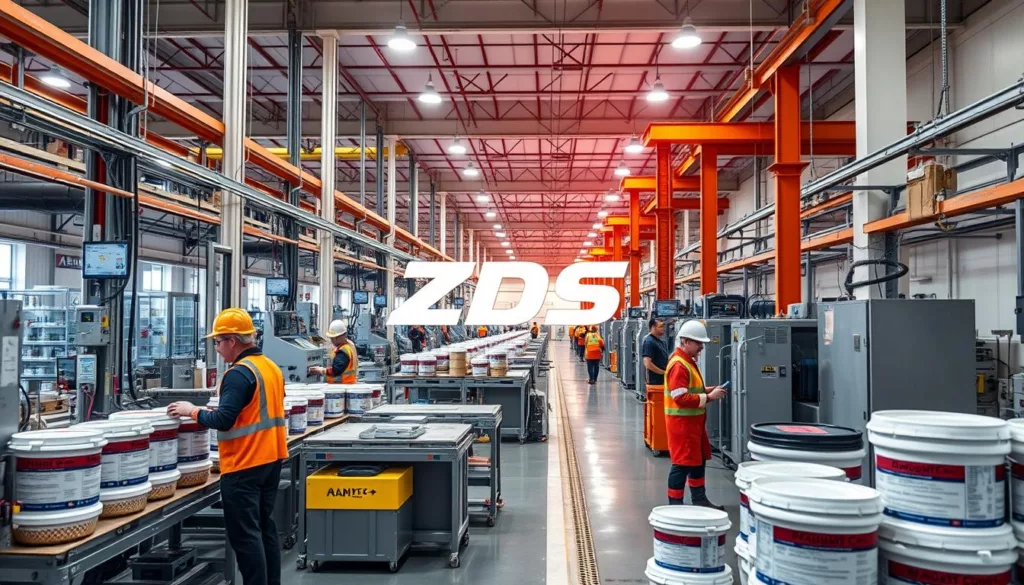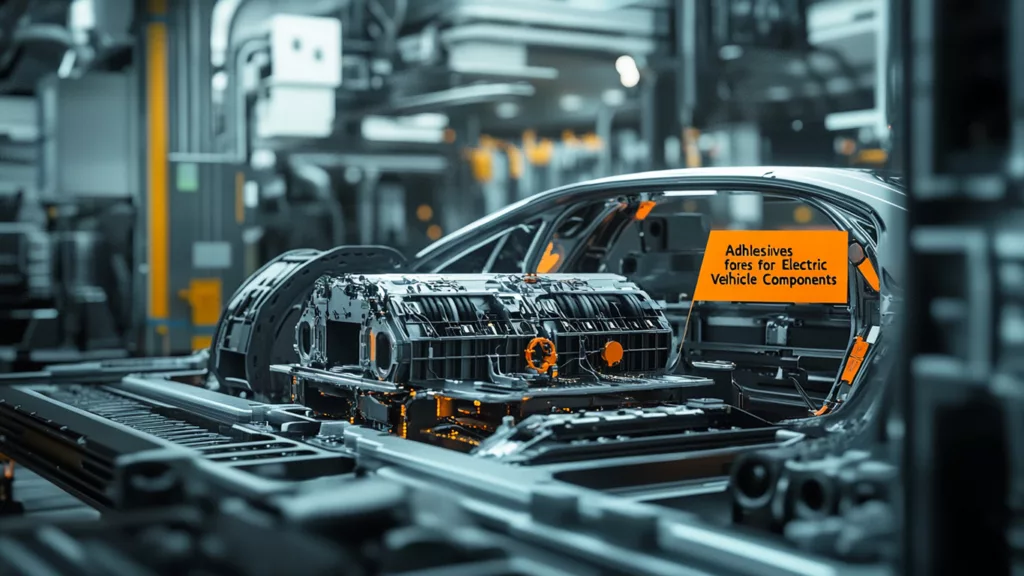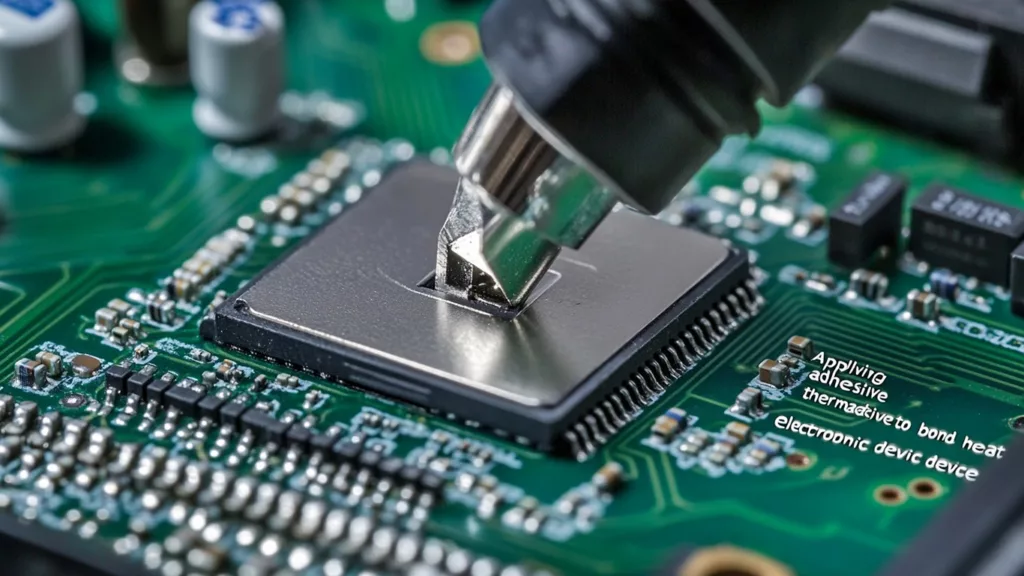Cyanoacrylate adhesives, also known as “super glue,” Benefits of using cyanoacrylate in manufacturing. They cure fast and bond strongly. Talking about their impact, it’s key to note they make manufacturing more efficient. They quickly react with water to form strong bonds. This means items can be put together with great precision and will last a long time.
This type of glue isn’t flammable, making it a safer choice in factories. It can also join a variety of materials, fitting perfectly into automated systems. This helps cut costs and make things run smoother. Cyanoacrylate adhesives are crucial for consistent, reliable results in busy work settings.
Key Takeaways
- Cyanoacrylate adhesives enhance manufacturing efficiency with quick curing times.
- Non-flammable and versatile, suitable for various industrial applications.
- Exceptional bonding strength ensures precision and durability.
- Integration with automated processes reduces costs and boosts efficiency.
- Ideal for creating strong bonds across different materials.
Introduction to Cyanoacrylate Adhesives
Cyanoacrylate adhesives, known as super glue, are essential in manufacturing. They bond quickly and strongly, ideal for various uses.
What is Cyanoacrylate?
Cyanoacrylate is a strong, fast adhesive made from acrylic resin. It cures fast when exposed to moisture, making strong bonds. These adhesives work well on many materials, like metals and plastics, because of their durability and versatility.
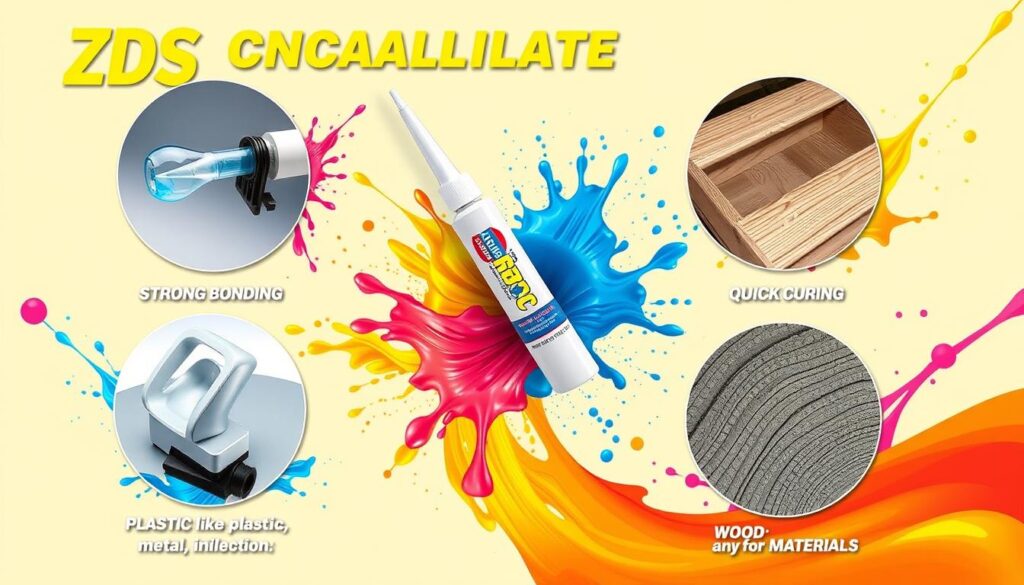
History and Development
Dr. Harry Coover found cyanoacrylate during World War II. He was making clear plastic gun sights. At first, people overlooked it. But its bonding power was later seen as valuable.
The 1950s saw super glue‘s development leap forward. It helps in many areas now, showing its efficiency and strength.
The story and improvements of these adhesives tell of their big role in making things. They solve both easy and hard bonding problems well.
- Chemical Composition: Primarily acrylic resin
- Primary Applications: Plastics, metals, ceramics, rubber
- Discoverer: Dr. Harry Coover
- Year of Discovery: 1940s
- Primary Development Surge: 1950s
These adhesives changed how we make things, offering easy and strong solutions.
Cyanoacrylate Adhesive Advantages
We have seen great benefits from using cyanoacrylate adhesives. They help in making work faster and products more reliable for businesses.
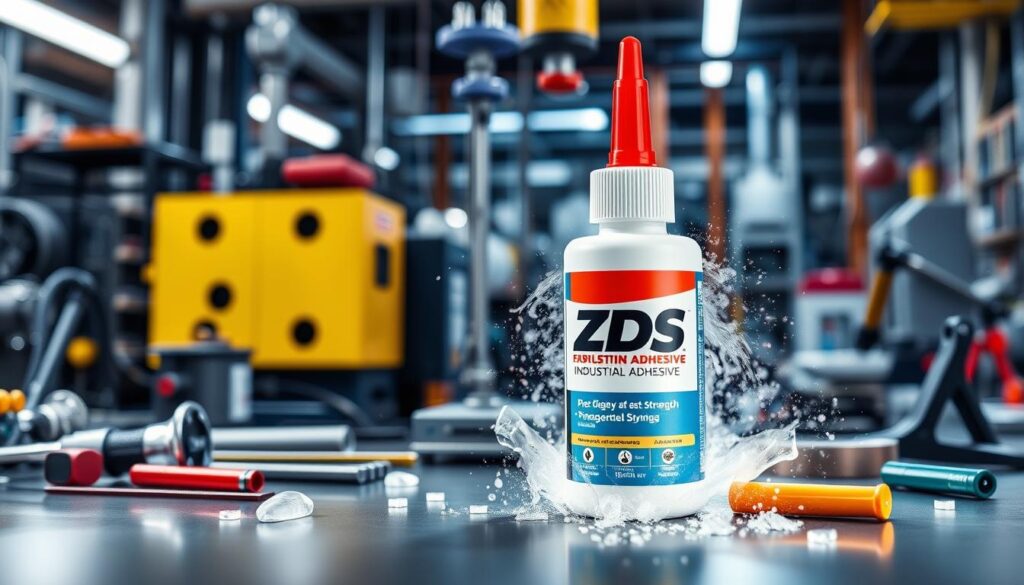
Speed of Bonding
Cyanoacrylate adhesives work very quickly. This fast-acting industrial adhesive makes production smoother and reduces waiting. It’s perfect for fast repairs and meeting tight deadlines.
Versatility in Applications
These adhesives stick to many materials, like plastics, metals, and rubber. Their flexibility means they can be used in lots of ways. This makes them a key part of different manufacturing processes.
Durability and Strength
Cyanoacrylate adhesives are strong and last a long time. They ensure things are put together well and stay that way. This leads to products that last longer and are very reliable.
In summary, cyanoacrylate adhesives offer quick bonding, can be used in many ways, and create strong, lasting bonds. They make production better and are essential in industry.
Cyanoacrylate Applications in Manufacturing
In the manufacturing world, cyanoacrylate adhesives stand out for being versatile and strong. They’re key in many manufacturing areas, from small tasks to big automated systems. Let’s explore why they’re preferred over other adhesives.
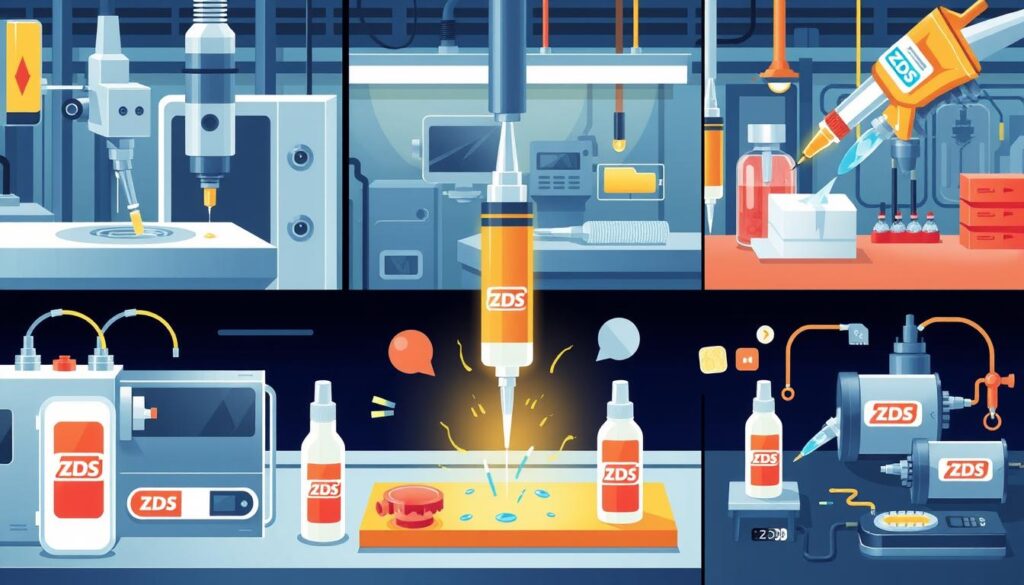
These adhesives shine in the auto industry, boosting production speed. They quickly join interior parts, making them look seamless and last long. In electronics, they help put together small parts fast and firmly. This makes devices more reliable.
In making medical devices, the strength and precision of cyanoacrylates are crucial. They’re used in critical parts like catheters and syringes. This ensures these devices are safe and perform well.
Cyanoacrylates also play a big role in creating consumer goods. They ensure products are tough yet good-looking. These adhesives create strong bonds for many household items and gadgets.
Cyanoacrylate adhesives are chosen for their ability to make manufacturing better. They make production faster while ensuring everything is strongly put together. Below is a look at how they’re used in different manufacturing areas:
| Manufacturing Sector | Cyanoacrylate Applications | Benefits |
|---|---|---|
| Automotive | Bonding interior components | Speed and durability |
| Electronics | Assembling intricate parts | Reliability and precision |
| Medical Devices | Assembling delicate components | Safety and performance |
| Consumer Goods | Bonding household items | Durability and aesthetics |
In summary, the broad use of cyanoacrylate adhesives in manufacturing shows their top-notch performance and efficiency. They greatly improve production speed, making them a mainstay in top-quality manufacturing.
Technical Benefits of Cyanoacrylate in Industrial Settings
Cyanoacrylate adhesives are important in industry for their strong bonds and resistance to the environment. They ensure the performance and reliability of parts in tough settings.
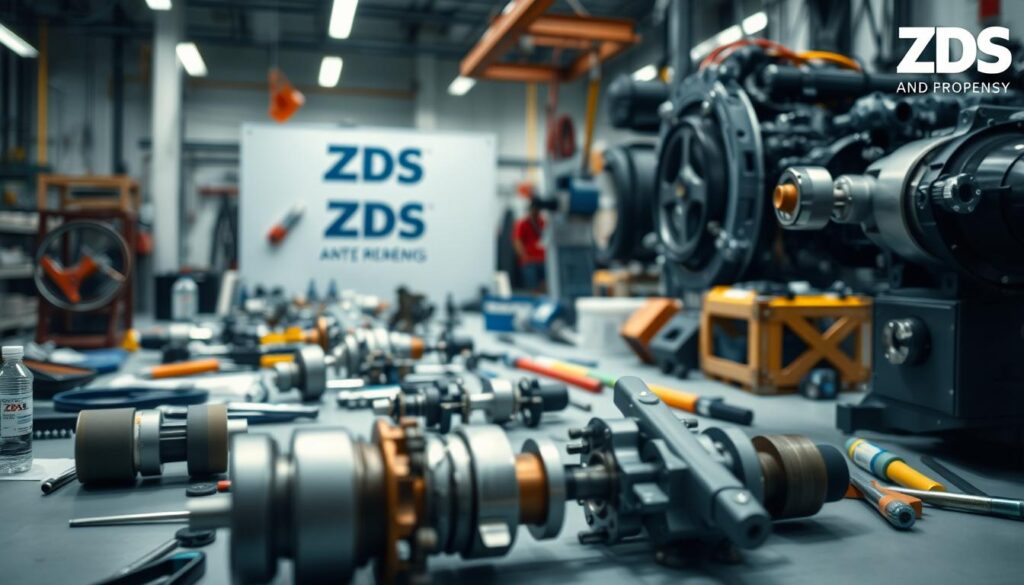
High Bonding Strength
The superior bonding strength of these adhesives is key. They create long-lasting bonds strong enough for heavy-duty use. This makes them perfect for assembling things like car parts and electronic devices.
The strong adhesion keeps materials tightly connected. This improves the product’s integrity and how well it works.
Environmental Resistance
Cyanoacrylate adhesives also handle extreme conditions well. They can withstand high temperatures and moisture. This trait is critical in industries that demand reliability.
Because they are so resistant, these adhesives ensure bonds last. This is important for keeping components intact in rough environments.
Why Choose Cyanoacrylate for Production Systems
In modern manufacturing, the right adhesive makes a big difference. Cyanoacrylate adhesives are top choices for factory use. They offer big advantages that make them stand out for industrial jobs.
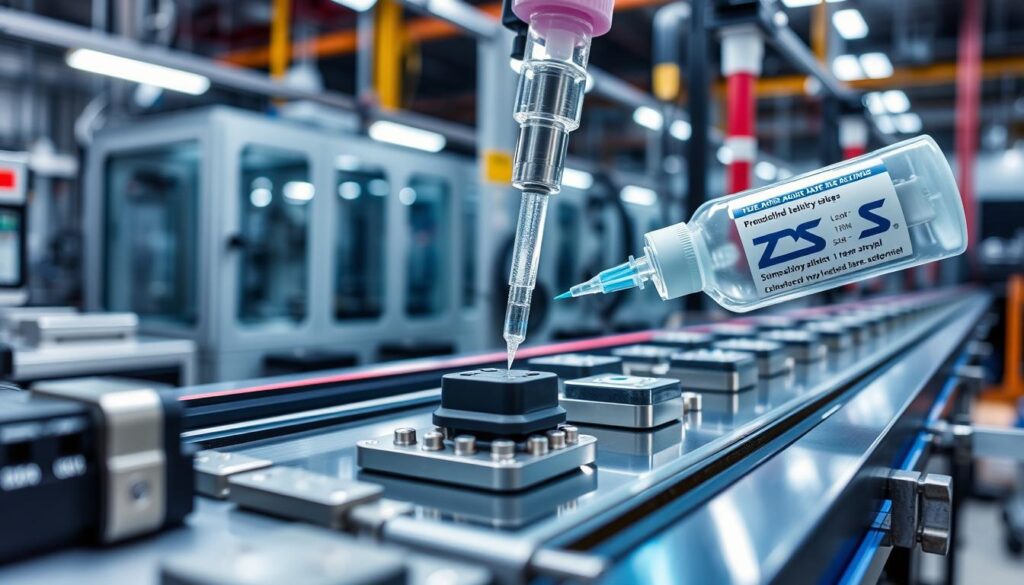
One of the top benefits of using cyanoacrylate in manufacturing is their incredible bonding speed. They bond super fast, unlike others that take a long time to set. This speed means less waiting and faster production, especially for making lots of items.
Cyanoacrylate’s reliability is also a big deal. It creates strong, stress-resistant joints. This is key for critical industries like cars and planes, where safety matters a lot.
These adhesives also stick to almost anything. Metals, plastics, and even ceramics, they handle it all. This makes them great for complex manufacturing tasks.
A comparison with other glues shows cyanoacrylates lead in efficiency and reliability.
| Adhesive Type | Bonding Speed | Strength | Versatility | Production Efficiency |
|---|---|---|---|---|
| Cyanoacrylate | Seconds | High | Excellent | High |
| Epoxy | Minutes to Hours | Very High | Good | Medium |
| Polyurethane | Hours | High | Moderate | Low |
| Silicone | Hours | Moderate | Good | Low |
This table shows cyanoacrylates beat other glues in key areas that matter for production. They offer quick bonding, work with many materials, and are very strong. This makes them a great asset for any factory.
In conclusion, for enhancing factory workflows, choosing cyanoacrylate adhesives is smart. They ensure better efficiency and reliable outcomes, leading to top-notch products.
Benefits of Cyanoacrylate in Assembly Processes
Cyanoacrylate offers many benefits in assembly processes. Its quick-setting adhesive properties stand out the most. This fast curing time cuts down on delays. It helps make assembly lines more efficient.
Adding cyanoacrylate to manufacturing workflows is easy and beneficial. It works well with different materials, so there’s little need to change current processes. This makes production smoother. Plus, its strong bond ensures quick and reliable structural integrity.
- Reduction in assembly time
- Decreased need for fixtures and clamping
- Enhanced overall production speed
The quick-setting nature of the adhesive speeds up the production cycle. It lets the next steps happen without delay. This keeps the assembly moving, important for tight schedules and large orders. The benefits of cyanoacrylate in assembly are clear. It’s crucial for modern manufacturing.
Industrial Uses of Cyanoacrylate
Cyanoacrylate plays a big role in industry because it bonds fast, with precision, and lasts long. We’re going to see how it’s making a difference in making cars and electronics.
Automotive Industry
Cyanoacrylate in automotive manufacturing has changed the game. It’s used to quickly stick together various parts. This includes small items like trim and logos, as well as big structural things.
Vehicles need bonds that are strong and won’t let go, which is why cyanoacrylate is perfect. It meets tough safety needs. Big car makers like Ford and Toyota use it to make things faster while keeping quality high.
Electronics and Appliances
For electronic gadgets, electronics assembly adhesive is key for precise and tough bonds. Cyanoacrylate glues small, delicate pieces together. Things like sensors, circuit boards, and chips stay put, even with environmental stress.
Brands like Apple and Samsung count on cyanoacrylate. It helps them make products that are precise and reliable.
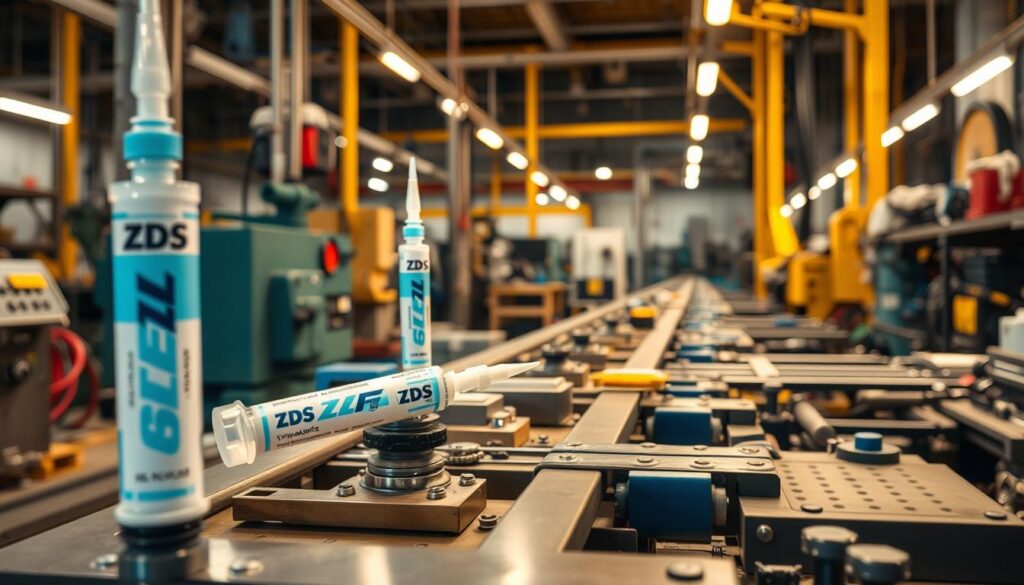
Cyanoacrylate is super useful in both cars and electronics manufacturing. It shows how good this adhesive is in different production settings.
Benefits of Using Super Glue in Manufacturing
Super glue, also known as cyanoacrylate, is great for manufacturing because it sets fast and holds strong. It has changed the way things are made, making production quicker and more cost-effective.
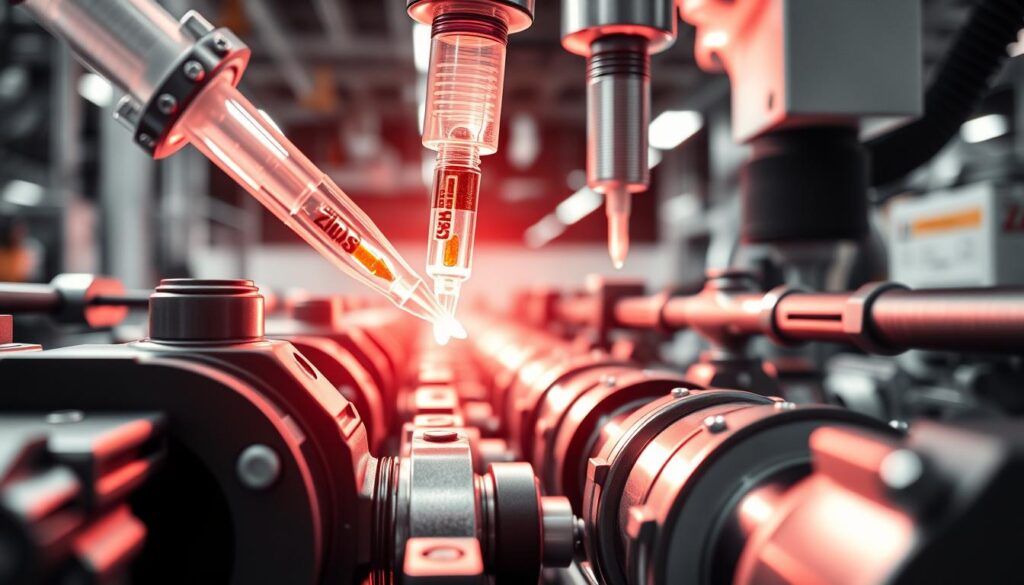
Time Efficiency
Super glue shines when it comes to saving time in manufacturing. It bonds things quickly, which means less waiting between steps. This fast action leads to more products made in less time, helping manufacturers stick to their schedules and boost productivity.
Cost Savings
Super glue also helps save money in manufacturing. It’s a cost-effective way to bond materials, cutting down on the need for heavy-duty tools. The fast bonding means less clamping time, and its precision reduces waste and the need for do-overs. This all adds up to savings.
| Benefits | Description |
|---|---|
| Time Efficiency | Quick bonding, allowing for faster throughput and increased productivity. |
| Cost Savings | Reduces the need for fixtures, lowers material waste, and minimizes rework. |
Using super glue in manufacturing means big time and money savings, making things run smoother and more efficiently. For a deep dive into choosing the right adhesive, check out this detailed guide.
Environmental and Safety Considerations
As we shift towards sustainable manufacturing, it’s crucial to think about the environmental and safety issues linked to cyanoacrylate adhesives. Taking safety measures seriously is important. It helps protect workers and lessens harm to our planet.
Proper ventilation in work areas is vital. It cuts down the risk of breathing in adhesive fumes. This makes for a safer work space.
Cyanoacrylate waste needs proper disposal to avoid harming the environment. Companies are choosing green adhesives more and more. This helps them stick to laws and boosts sustainability.
Advancements in sustainable manufacturing practices have led to the creation of eco-friendly cyanoacrylate. These efforts aim to lower emissions and make adhesive materials easier to recycle across industries.
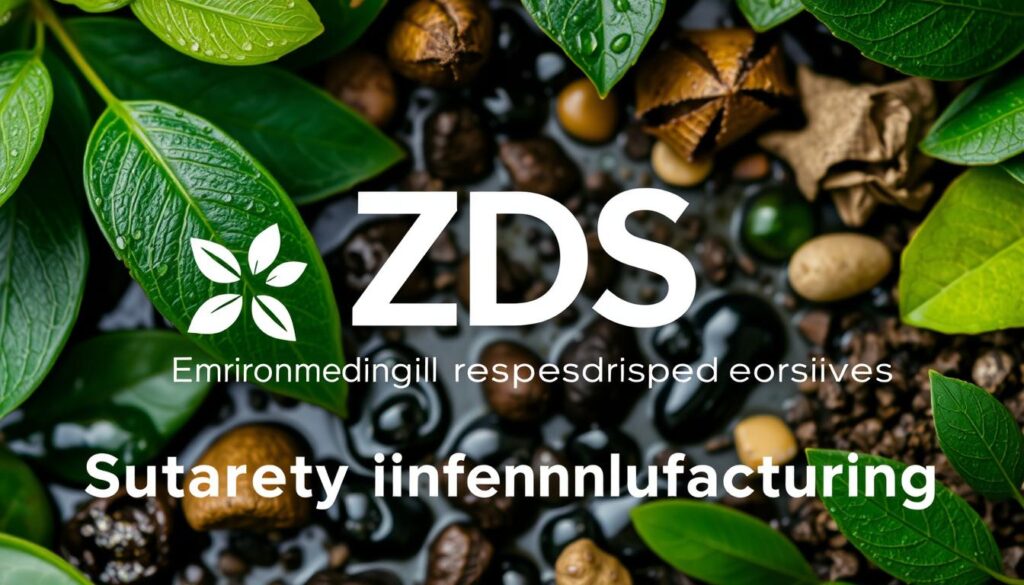
Let’s look at why sustainable practices are becoming popular, through the lens of cyanoacrylate adhesives’ benefits:
| Industry | Sustainability Advantages |
|---|---|
| Automotive | Lighter, stronger bonds improve fuel efficiency and overall vehicle performance |
| Aerospace | Reduces weight and enhances durability, contributing to better fuel economy |
| Construction | Provides strong, long-lasting bonds that decrease the need for frequent repairs, reducing material waste |
By focusing on cyanoacrylate safety and choosing green adhesives, industries can protect workers and the earth. This dual commitment to safety and green practices drives innovation in manufacturing.
Future Trends and Innovations with Cyanoacrylate
Cyanoacrylate adhesives have a bright future in industry. They are at the forefront of new bonding technologies. These trends will solidify cyanoacrylate’s role in manufacturing.
Developments in Cyanoacrylate Adhesives
There’s excitement around new, flexible, and eco-friendly cyanoacrylate adhesives. Companies aim to use green materials due to laws and customer wishes. They’re enhancing adhesives to resist heat and chemicals better. Check out ZDS Chemical’s exploration for more info.
Potential Industry Applications
Cyanoacrylate is spreading into automotive, electronics, and construction sectors. They’re crafting adhesives for extreme heat and tough conditions, perfect for cars and spaceships. In electronics, the goal is fast-setting, strong adhesives for quick production.
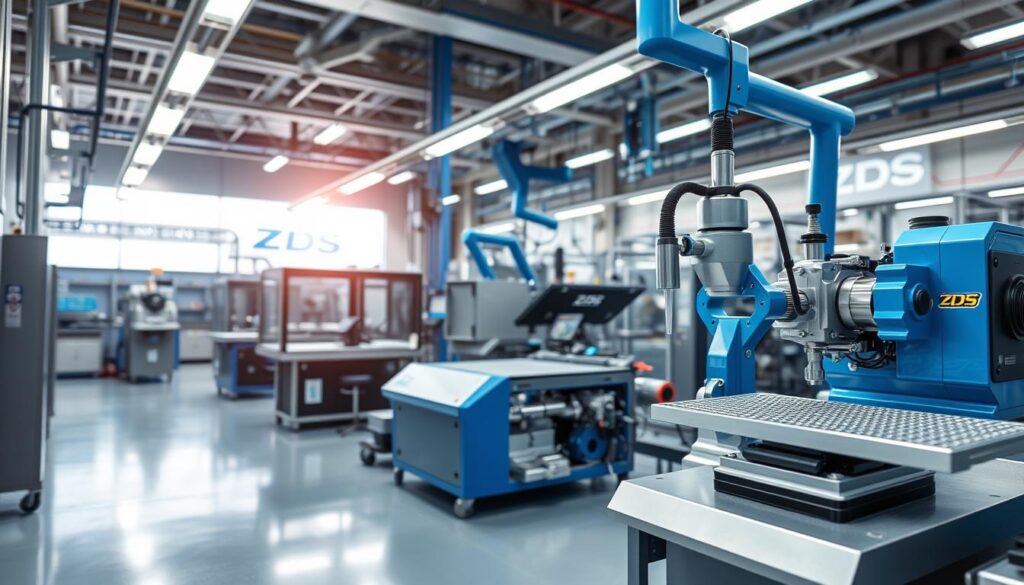
For construction, adhesives now bond various materials like composites and metals. This opens doors for new building and infrastructure uses. Such advancements show cyanoacrylate’s growing role in making industries more productive and versatile.
| Industry | Innovative Bonding Technologies |
|---|---|
| Automotive | High-temperature resistant adhesives, fast curing |
| Electronics | Quick bonding, high-strength adhesives |
| Construction | Bonding composites, lightweight metal applications |
| Aerospace | Enhanced thermal and chemical resistance |
Conclusion
Cyanoacrylate adhesives are a big deal in making stuff. They cure fast, stick strong, and are easy to use. This makes them key for making cars to electronics better and faster.
These glues save time and money, which is super important in the business world. Handling them is pretty straightforward, even if they stick to your skin by accident. The cool part? They dry super quick, especially with special accelerators. To learn more, check out this article.
We’re excited about what’s next for these glues. They will likely open doors to new ways of making things. Using these adhesives will help keep manufacturing moving forward. In conclusion, they’re crucial for the future of making stuff better and more efficient.
FAQ
What are the benefits of using cyanoacrylate in manufacturing?
Cyanoacrylate adhesives boost production by fast and durable bonding. They allow for precise application. This makes them top choices for industrial uses, enhancing workflow and product quality.
What is cyanoacrylate?
Cyanoacrylate, often known as “super glue,” bonds quickly and strongly. It works well with many materials. Its quick cure time and strong bond make it great for both home and factory use.
What is the history and development of cyanoacrylate adhesives?
Discovered in the 1940s, cyanoacrylate adhesives have a long history. First made by Eastman Kodak, they’ve improved greatly. Now, they’re key in manufacturing, offering better performance than ever.
What are the advantages of cyanoacrylate adhesives in industrial applications?
Their fast bonding speeds up production. They work with many materials like plastics and metals. Plus, they’re very strong and durable, ideal for industry demands.
How are cyanoacrylate adhesives applied in manufacturing?
They’re used in various manufacturing settings, from small tasks to big automated systems. They’re chosen for their speedy, strong bonding. This helps make production more efficient, saving time.
What are the technical benefits of cyanoacrylate in industrial settings?
They bond strongly and resist environmental stress like temperature changes and moisture. These qualities keep industrial parts secure and lasting long.
Why should we choose cyanoacrylate for production systems?
It improves efficiency, reduces costs, and is reliable. Cyanoacrylate’s quick drying and strong bonds lower the need for extra steps. It’s great for industries seeking efficiency.
How does cyanoacrylate streamline assembly processes?
It dries quickly, cutting down on wait times and helping with fast prototyping. It easily fits into existing processes, boosting efficiency and product output.
What are the industrial uses of cyanoacrylate?
It’s key in both automotive and electronics sectors. For cars, it bonds parts swiftly and securely. In electronics, it ensures precision and strength. Its flexibility makes it valuable across industries.
How does using super glue in manufacturing save time and costs?
Super glue quickens production with its fast bonding. It lessens the need for extra tools and reduces waste. This makes manufacturing more effective and cost-efficient.
What are the environmental and safety considerations when using cyanoacrylate?
Safety is key, so proper ventilation and following guidelines are musts. Manufacturers work on greener options too. They aim to keep cyanoacrylate effective while being eco-friendly.
What are the future trends and innovations with cyanoacrylate adhesives?
We’ll see more flexible and greener formulas soon. New uses in different sectors are also expected. These steps will boost its effectiveness and widen its application range.

